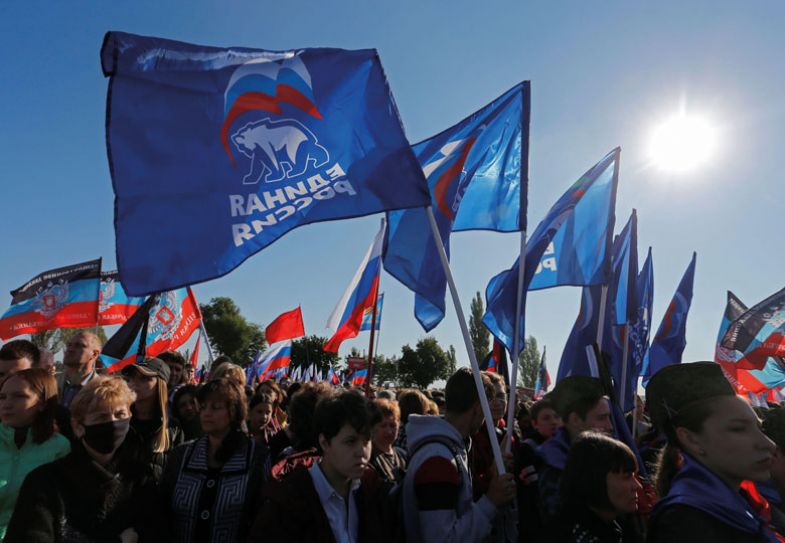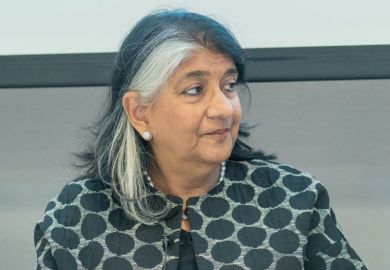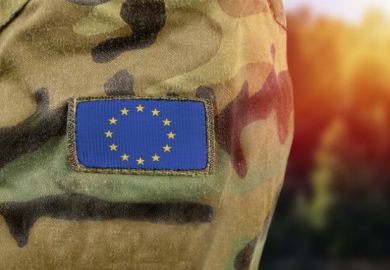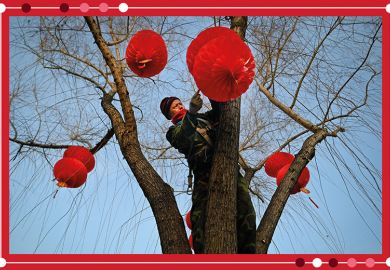When, nine days into their country’s invasion of Ukraine, Russian university rectors urged students and staff to “support our president” in the wake of “the most difficult…but necessary decision of his life”, many in the West imagined tortured discussions behind the scenes.
The statement on Moscow’s so-called special operation, signed by more than 700 Russian university rectors in March, was interpreted by many as another example of Vladimir Putin’s iron grip on Russia’s public institutions. In private, observers reasoned, these university leaders would surely be appalled by the unprovoked shelling of civilians, including of fellow academics. Highly educated scholars were only paying lip service to the absurd Kremlin propaganda that sought to justify war.
Unfortunately, this optimism is not well founded. While some Russian academics may sign pro-Putin statements for careerist reasons, many support him and his aggression against Ukraine from the bottom of their hearts. However, that broad support found among both ordinary Russians and the country’s elites is not just a result of slavish coverage from state broadcasters and newspapers; its roots lie deep in Russian academia and, in particular, in the corruption of a social sciences field dominated by nationalism, conspiracy theories and a Manichaean worldview, in which Russia will forever be pitted against the tyrannical West.
Russia’s social scientists – many of whom are increasingly untethered from reality – have been prominent in justifying the invasion of Ukraine, not just by appealing to patriotic sentiment but also by calling on decades of so-called scholarship published by Russia’s insular publishing industry.
This may sound exaggerated. But consider how many of Russia’s social scientists have made their position known repeatedly and unequivocally. In a New York Times interview in July, Sergei Karaganov, the once respected dean of Moscow School of Economics (HSE)’s Faculty of World Economy and International Relations, set forth his views that Ukraine represents an existential threat to Russia, which was right to launch a pre-emptive attack against “liberal globalist imperialism” being pursued by Western powers.
These shrill tropes pushed by Russian public intellectuals have been ignored by the global academy, yet they are now having terrible real-world consequences on the battlefields of Ukraine. But how did they capture Russian social science?
The answer lies in a series of hitherto little-noticed pathologies of post-Soviet political culture that must now be acknowledged if the West is to truly understand how the Ukraine conflict arose, and why similar conflicts may happen again even if Putin leaves the global stage. But it also relates to a number of quasi-academic lateral thinkers whom Russian academia has indulged as curious colleagues, both within universities and at external conferences, citing them approvingly in the pages of intellectual journals.

The authors of these speculative works would normally be dismissed as harmless cranks by most academies. Indeed, they have been ignored by Western scholars on account of their methodological weakness and empirical thinness. But they have gained a growing public resonance within Russia. Moreover, their counterfactual and often conspiracy-laden alternative histories have soared in popularity by offering crude, simplistic and speculative explanations of social developments in post-Soviet Russia. Such scholarship is, for many, a crucial form of national soul-searching, devoured by a grateful readership still bereft after the fall of the communist state ideology.
The occasional oddball thinker within social sciences is to be expected. But the lack of critique of their strange and baseless theories is truly unusual. As a result, entirely new para-scientific disciplines have emerged, including what might be called “bio-ethnology” or “physio-geopolitics” (more on this later), both of which are designed to reveal a hidden “deep” past to the structures and laws of societies.
These theories present a comprehensive reinterpretation or even a fundamental rewriting of human history. Take the Lomonosov Moscow State University mathematician and amateur historian Anatoly Fomenko – widely read and revered in Russia – who has claimed for more than a quarter of a century that most Chinese and Arab history was fabricated by Jesuits in the 17th century. He also maintains that Jesus was crucified in Istanbul in the 12th century and that the Crusades and the Trojan War are the same historical event, rather than events separated by some 2,000 years. Mongol leader Genghis Khan was also Russian, he says, whose followers subsequently built the Great Pyramids before colonising America and establishing a Christian community of Incas in Colombia.
The persistence of his work in Russia points to a grim truth. Both students and doctoral candidates in Russia are confronted with a wealth of different theories of history and politics – in academic literature, social networks and partly even in serious educational institutions – but very few of these theories are based on methodologically sensitive social research and robust peer-reviewed investigation. These exotic alternative doctrines appeal beyond academia too, meaning that serious and internationally recognised political scientists, sociologists and historians – who, of course, also exist in Russia – are drowned out. They sink in the apparently pluralistic cacophony of a media and intellectual discourse littered with speculative commentaries. The government-sponsored oversupply of Manichaean explanations of the world – especially regarding the conflict between Russia and the West – creates new demand for culturally pessimistic and proto-fascist ideologies.
The proliferation of these colourful anti-Western talking heads in Russia in recent years is only partly a product of targeted manipulation of public discussion and decision-making by Kremlin spin doctors. Another big reason lies in the social science departments, where proponents of quack theories have, sadly, not been debunked. Two important examples have particular relevance to Ukraine: the pseudo-ethnologist Lev Gumilyov, who died in 1992 but who has become massively influential, and the modern-day metaphysician Aleksandr Dugin.
In many ways, they could not be more different. Gumilyov was the son of two famous Russian poets; his father was executed by the Soviet secret police, the Cheka, when Lev was nine. Gumilyov’s anti-Stalin writings would appear only sporadically during the communist period but were subsequently published in large numbers and have posthumously influenced post-Soviet society for more than 30 years. Meanwhile, Dugin emerged as a critic of pro-Western Russian policies in the early 1990s and began publishing in the year of Gumilyov’s death. Since then, the bearded metaphysician’s multimedia activity has also grown steadily.
Both are champions of the concept of Eurasianism – namely, that Russian civilisation does not belong in either the European or Asian categories and that Russia, along with its former Soviet satellites, should resist closer international ties. Despite Gumilyov’s political views (he spent most of his youth in Stalin’s labour camps), he was integrated into the late Soviet scientific establishment and his works are now used as textbooks in schools and universities.
Dugin is his spiritual heir, but he reaches a different demographic by appealing to a younger, less academic audience with his numerous texts and video performances. He is also said to have an avid readership in Russian military academies and security services. Unlike Gumilyov, who is little known internationally, Dugin is notorious outside Russia as a Russian extremist. He gained further attention when his 29-year-old daughter, Darya, was assassinated in August by a car bomb seemingly intended for her father.
Although Dugin is often said to be “Putin’s brain”, there never seems to have been a meeting between the philosopher and the president, whose proclaimed Eurasianism has different sources and content than Dugin’s so-called neo-Eurasianism.
Nonetheless, Gumilyov and Dugin have a similar social impact with their writings. In their own way, they each helped shape Russia’s intellectual landscape and infiltrated the country’s social sciences and its humanities with alternative historical narratives. With their writings, they have laid the groundwork for Russia’s war against Ukraine and the new systemic confrontation with the West – unwittingly so, in the case of Gumilyov, and very consciously, in the case of Dugin.
The basis of the powerful creed of Eurasianism should have been debunked years ago, however. Gumilyov’s magnum opus, Ethnogenesis and the Earth’s Biosphere, develops a comprehensive theory of world history that is partly based on biology. Unlike Nazi thinkers, he was not a primitive racist who hierarchised groups of people according to racial characteristics. Instead, he connects the socio-political life of cultural communities with extra-societal determinants, such as the weather or even solar radiation, that allegedly act on communities.
According to his view, ethnic groups (nationalities and nations) and super-ethnic conglomerates (pan-national groups and civilisations) are primarily natural, with the historical process of country formation less important. These ethnic groups are in a cyclical process of ascent and descent, in which “passionate” heroic figures and parasitic foreign groups play central roles. While selfless and self-sacrificing “passionaries” may lead an ethnic group to its blossoming, the mixing of a host ethnic group with representatives of foreign ethnic groups (such as Jews) results in so-called chimeras, doomed to extinction. Mysterious micro-mutations caused by certain cosmic and solar radiations, which Gumilyov does not specify further, are responsible for more or less dynamism in the development of ethnic groups and great civilisations.
Such ideas are one reason why Gumilyov has received little recognition outside Russia. But they have helped Gumilyov achieve fame in Russia, where he is still acclaimed by many as a genius. His largely positive reception, even in parts of the Russian academy, has shaped the formation of partly bio-ethnological post-Soviet Russian civilisational studies. Some of his closed historical models are taught at universities.
In contrast, Dugin belongs more to the new era of social media communication and mainly sits outside academia, although he was head of Moscow State University’s department of sociology of international relations for five years. His oeuvre is more diverse and difficult to explain concisely, but its basic motif is the radical rejection of today’s liberal world and the need for conflict to overcome Western-influenced postwar modernity.
Despite, or perhaps because of, Dugin’s elliptic, inconsistent and moody rhetoric, he has found a following in the worldwide anti-liberal and, in particular, neo-fascist milieu. During visits to the US, Dugin was received by the late political scientist and diplomat Zbigniew Brzezinski, as well as by Francis Fukuyama, for brief talks, which Dugin made public afterwards and has mentioned repeatedly ever since. In 2014, the prestigious US journal Foreign Policy even classified Dugin as one of the world’s 100 “leading global thinkers” in the category of “agitators”. Such overvaluations of his influence illustrate the astonishing attention that Dugin’s speculative narratives have received.
One important strand of his work involves a fascination with the Third Reich’s “crown jurist” Carl Schmitt, which led to a temporary enthusiasm for a kind of physio-geopolitics. According to this approach, the physical location of nations on continents and their distance from the oceans, as well as the resulting land- or sea-based character of their cultures, explains world history. The collectivist and authoritarian land powers, today led by Russia, are in a centuries-old struggle for existence with the individualist and liberal sea powers, today led by the US, Dugin argues.
His described “neo-Eurasianism” is, in fact, a disguising tool to incorporate any number of non-Russian anti-liberal ideas, such as National Bolshevism, political occultism and ethnopluralism, into Russian intellectual discourse. He uses the name of the “Eurasianists”, a renowned interwar Russian intellectual émigré movement, to conceal the often proto-fascist Western sources of his radically anti-Western theories. Although Dugin’s writings have failed to gain wider resonance in Russia’s social science establishment, and he is generally not perceived as a serious academic even among Eurosceptic Russian social scientists, his speeches have found an audience.
In this respect, Dugin, among other conspiracy theorists, has contributed to poisoning the Russian public space with Manichaean ideas. The dominant presence of Dugin and similar actors in Russia’s social media and bookstores has contributed to the popularity of other dubious historical and social science findings for explaining Russian and broader international relations.
Such infiltration of speculative thinking into the public intellectual discussion can, of course, be also observed in other societies around the world, most recently in quite a few Western countries, too. However, the detachment of intellectual and media debates from the results of empirical research goes much further in Russia. In recent years and months, it has led to an increasing emigration or isolation of Russian social scientists and historians whose research is based on rationalist and empiricist premises.
The renewed distortion of the relationship between social science and Russian society after the end of the USSR had already begun before the interventions of Putin’s political technologists in public discourse started in the summer of 1999. The popularity of Gumilyov, Dugin, Fomenko and a host of similar pseudo-historians was therefore not only a symptom of the rise of a new post-Soviet anti-liberalism. The thousands of writings and other media products of Russian anti-Western para-intellectuals were also a determinant of Russia’s turning away from Europe in the new millennium.
A recovery of Russian society will require not only a change of political regime. It also depends on a rebirth of the country’s social and historical sciences, as well as its humanist intellectual discourse.
Andreas Umland is an associate professor in the department of political science at the Kyiv-Mohyla Academy (NaUKMA). He is also an analyst at the Stockholm Centre for Eastern European Studies (SCEEUS), part of the Swedish Institute of International Relations. He studied politics and history in Berlin, Oxford, Stanford and Cambridge. An earlier version of this article appeared in Durham University’s Global Policy journal.
Register to continue
Why register?
- Registration is free and only takes a moment
- Once registered, you can read 3 articles a month
- Sign up for our newsletter
Subscribe
Or subscribe for unlimited access to:
- Unlimited access to news, views, insights & reviews
- Digital editions
- Digital access to THE’s university and college rankings analysis
Already registered or a current subscriber?

















